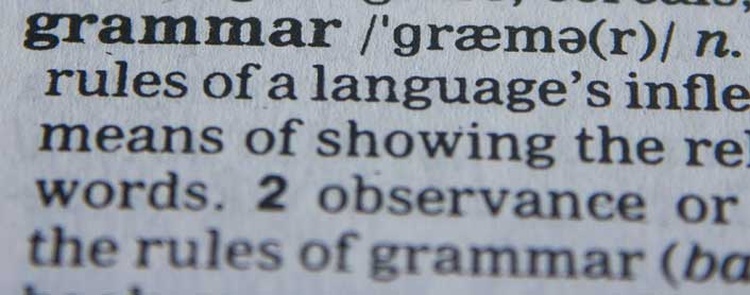Like most authors, I receive a fair number of letters dealing with fine points of grammar, and whether a word I’ve used actually qualifies as a word. Recently a reader wrote to share that she’d heard from an authoritative speaker that “impacted” cannot be used as a verb, and only applies to an abnormal condition of teeth. She was therefore suggesting I not use it in the sense of “that book really impacted my life.” Since many of the things I shared with her relate to concerns often raised by readers seeking to follow what they were taught decades ago in English class, I thought it might be worth posting my response to her.
Dear Liz,
Your comments on “impacted” touched on something that as a writer I have to face all the time. And since I’m not immersed in a book project for the first time in many months, I have the luxury of writing a long note! I’d like to explain a few things, partly for you and partly so I can cut and paste it to respond to similar emails as they come in.
My main point is that in any objective sense, there simply are no rules of English. There are just common and less common practices in English usage. God said from Sinai “Thou shalt not murder.” But who said from what mountain, for instance, “thou shalt not end a sentence in a preposition”? Many have said it, of course—the point is, on whose authority, and how binding is it? Who makes the rules, who enforces them, and who says the rules from fifty or twenty years ago are still in force?
The debate about “impact”—and the other innumerable nouns that have been conveniently converted into verbs—has gone on for decades. But both the dictionary (just checked my 9th collegiate Webster’s, 2nd def is “v., to make an impact on”) and—more importantly—common usage, at least in the states, demonstrate its legitimacy as a verb.
In other words, in my opinion, the speaker you heard was wrong—”impact” as a verb is not a non-word, regardless of whether the Oxford dictionary recognizes it. (You live in the country of Oxford, but as much as I love Oxford—and I really do—I live in the country of Webster, which reflects American usage; but I don’t live and die by Webster’s either).
I’ve heard people say the same thing about “impacted” and many other words. Of course, someone is free to say “I don’t like that usage,” but there’s a big difference between saying that and “This usage is wrong.” It’s the difference between “I don’t like broccoli” and “broccoli is bad.” Now, I’m not a big broccoli fan, but to say broccoli is a non-food just because someone doesn’t like it is going too far.
Personally (and this is a truly subjective thing) I think “impact” as a verb is a good and welcome usage, far less awkward than always saying “have an impact on.” The big thing in writing is economy of words, so any time you can use one word instead of four it’s considered a bargain. And as time goes on, shorter ways of saying something are increasingly favored. (Part of this is because of word count in newspapers—use less words, kill fewer trees, spend less money, keep more readers.)
Please realize I take no offense whatsoever at what you called your “English lesson,” Liz, and I trust you’ll take none at this response. In fact I find your input stimulating, and that’s why I’m responding like this. As you might guess, I’m used to dialoguing with people who have strong and conflicting opinions on grammar and word use, and there are many schools of thought, so as a writer whenever I conform to one school I inevitably violate another.
For instance, I have a friend from the old school who tells me I should never end sentences with prepositions, or use split infinitives. (I quote Winston Churchill who said, “That’s the kind of arrant pedantry up with which I shall not put.”) The point is, avoiding ending a sentence with a preposition may please grammarians, but it often makes for very awkward sentences (e.g. attempt to rewrite these: “Thanks for looking this over;” “Here’s what I’m getting at;” “Do you know what I’m talking about?” In each case, a clear statement becomes tortured—”here’s at what I’m getting”?!)
Likewise, sometimes it sounds stodgy or convoluted “never to split” an infinitive, rather than “to never split” an infinitive. Sometimes it obscures the intended meaning—e.g. when “he wanted to be fully briefed” is changed into “he wanted to be briefed fully” (that’s okay) or, misleadingly, “he fully wanted to be briefed.”
But since there’s no committee of English teachers (and by the way, English teachers regularly disagree with each other) who has authority to say what you can and cannot use, it all comes down to making a judgment call as to what effectively communicates and what doesn’t. Language is fluid, always changing, which is why in 1611 the King James version was as cutting edge as the New Living Translation is now. The issue is, does your audience understand the words in their context?
I hold to the philosophy that every writer should know the “rules,” and once you know them you are then qualified to break them—and when your reader will benefit through economy of words, you should write for their benefit, not for that of grammarians. Once I was writing an article on sexual purity for Discipleship Journal, a major Christian magazine. In the final sentence I’d dealt with the command to flee from immorality, and wrote something like “we must set our minds not on what we’re fleeing from, but on who we’re fleeing to.” I told them I realized the rules I was breaking but that the structure was necessary in order to flow and be memorable. I begged them not to change it. But they did, and gave the article an ending I thought of but didn’t want, like “set our minds not on from what we’re fleeing, but toward whom we’re running.” Now, you might prefer their ending, but I thought it was really lame.
We must daily test our willingness to be “incorrect” for the sake of effective communication. Someone says “I’d like a coffee.” The usual reply is “Me too.” Grammatically incorrect, of course. The technically “proper” reply is “I too”—but even though I know this I will never say it. Why? Because it will seem wrong, since it goes against the grain of common practice. Who wants to be “right” if it sounds stupid? And more particularly, if it sounds stupid, maybe that’s the telltale sign it isn’t “right” in the only meaningful sense. (Language is highly pragmatic—what’s right is what works.)
Our language is full of such things. “Alleged” murderer is incorrect, since a murder can be alleged, but a murderer can’t. But that’s what everyone says, so you either use it or you have to add a bunch of words, e.g. “The man who is alleged to have committed a murder.” Why say all that when you can say the “alleged murderer”? Likewise “an accused spy” is not a spy who is accused, but someone who is accused of being a spy. But once again economy of words wins out.
I can tell you from firsthand experience that a particular publishing house copy editor will never accept “he was chomping on his cigar.” She will invariably change it to the dictionary’s “he was champing on a cigar.” (Even my spellchecker insists I must use champing, not chomping.) I always have to plead my case (not that my books are full of cigars): “I have only one problem here—no one says that, and the reader will stop in his tracks, thinking champing is a misspelling of chomping.”
I don’t care about being in harmony with the dictionary, since not one reader in a hundred will look it up! I just want the reader to understand what I’m saying. It seems likely that the dictionary editors are looking over each others’ shoulders and want to pass muster with each other. Who’s going to be the first to admit that ‘chomp’ not ‘champ’ is the commonly used form, and therefore “correct”?
This whole discussion is particularly distressing for some Christians because it sounds like the verbal equivalent of moral relativism. The difference is, morals are rooted in the unchanging character and decree of God. But dictionaries are not the linguistic equivalent of Scripture. They do not set rules, they merely measure predominate usage (sometimes incorrectly). In other words, they are descriptive, not prescriptive. (As Webster’s demonstrates, “impact” is already officially recognized as a verb, but my point is, even if it wasn’t, that wouldn’t make it illegitimate.)
Originally, language purists objected to the crass reduction of pianoforte to piano, but eventually they had to let it go. For a long time the word “create” was never used of men, because “only God can create.” The debates about “who” and “that” never end. Arguably, the average person doesn’t care, just as long as he can understand what it means. The standard practice of no longer capitalizing pronouns of deity has caused many readers to think their once-favorite Christian authors have gone liberal. On and on it goes.
The expression “if worst comes to worst” must be wrong, they say. The proper form must be “If worse comes to worst.” Well, it was worst, not worse in Don Quixote, and regardless of its origins the idiom is the idiom and no appeal to “correctness” will change it.
Working with different publishers is interesting and sometimes frustrating. I’ve learned to write things certain ways based on the standards of the copyeditor at one publishing house. Now, having sat at her feet, I do these things automatically, only to get it overruled by the copyeditor at the other publishing house, who changes it back to the way I always used to do it. Who’s right? There’s no objective way to give answer that—both can make their case, but it comes down to “what sounds right?” and of course some who like Mozart don’t like Elvis, but how do you objectively say one’s right and the other’s wrong?
With each new book, I always ask several staff members at EPM to read over manuscripts and proof pages to find errors. They do a great job, but I smile when I see many of the changes we all make. These all educated people, and we are all convinced this way or that way is correct (e.g. there should or should not be a comma before the ‘and’ in “Bob, Jane, and Shirley”). We all either remember “that’s what I was taught in English” (unfortunately we were all in different English classes, none of them recent) or “the other way looks weird.” Actually, the second evaluation is the more pertinent one. Before stuff leaves the office I frequently have to make a judgment call between at least two and sometimes three conflicting opinions on a grammatical issue. And no matter which way I go, the copyeditor is likely to change it.
Take the “rule” that goes “don’t use nouns as adjectives.” Alas, “population explosion,” “stock market,” “storm warnings” and innumerable other examples show that this “rule” (or rather, once-common practice) is no longer in force. Some copy editors will change “over $100” to “more than $100.” But is it really worth the change? Why use three words when you can use two? The word “scan” originally meant to scrutinize, to examine closely. What does the word mean now? The exact opposite—to look over without close examination. But is it worth it to fight for the old use? No. Because in language usage, “old” or “original” is not synonymous with “correct.”
When it comes to word usage, of course, dictionaries never tell you the right way to do it. They only tell you different possible ways of doing it, and almost never include them all. The dictionary doesn’t tell you what the word “hand” means, only its context does. The dictionary tells you a dozen different ways the word hand can be used, but never how it’s actually used in the sentence in front of you. And there’s usually a thirteenth or fourteenth way it doesn’t mention, which may have come into vogue since the dictionary was assembled. When somebody says “Michael Jordan is bad,” they mean he is good—but only the most current and popular dictionaries would give “good” as a possible meaning for “bad” (I doubt the Oxford Dictionary would stoop to listing this meaning as an option.)
There’s a common practice in the youth culture in our neck of the words that I personally can’t stand. I’ve talked with both our daughters (they’re both well-spoken, in fact articulate, and outstanding writers) on this: “Me and Dan are going to the store.” “Me and Sarah stopped at Taco Bell.” When I’ve pointed out the error, they say that “Sarah and I stopped at Taco Bell” sounds wrong, because none of their friends say it that way. I’ve heard their friends, many of them honor students, and they’re right—they don’t say it that way. Then I say “But it isn’t your friends you’ll be doing a job interview with, it’s old people like me.” I have the impression that high school English teachers may have given up on this, as it’s so widespread. I wouldn’t be surprised if ten years from now it’s considered acceptable—but I admit I sure hope it isn’t!
But ten years ago, who would have believed there would be widespread literary acceptance of mixing singular and plural as in “If someone wants to go to Europe, they can book a flight.” Someone is singular and they is plural—once mixing them was absolutely forbidden, and it was a mistake that marked you as an amateur. No longer. I was filling out a reference form for someone applying for a government position and it kept doing this over and over. Of course, it’s a way of getting around saying “he or she.” Twenty years ago it would have been “he can book a flight” but you don’t want to be sexist. Yet saying “he or she” is so awkward when you have to keep using it that “they” has become acceptable for pragmatic reasons. Publishers say now “this usage is acceptable.” In fact, they will now routinely change your “he” to “they” in the copyediting. It makes me want to put in a footnote saying to the reader “I don’t like this either—so please don’t send me letters, send them to the publisher!”
Coming full circle back to “impact,” nouns are verbed all the time. “Contact” was once just a noun, and when it was first used as a verb, purists objected. Likewise, “feature” was first a noun, but I hear no one object to “the magazine featured an interview with George W. Bush.” “Worsen” is shorthand for “become worse.” Since my Webster’s dictionary that defines “impact” as “to make an impact on” is seventeen years old, it’s been at least a few decades since this word made its transition from an exclusive noun to a noun or verb (in the non teeth sense). I commonly use it now, as do many people I know (and not just Christians—you see it in secular newspapers), and no copyeditor has ever changed it. For better or for worse, it’s now as much a part of our language as the verb forms of “contact” and “feature.”
Of course, if the transition has been recent enough that there are enough people like you who are bugged by the use of “impact” as a verb, then using it may not be worth it. I wouldn’t use it if I was speaking to a group of English teachers over forty, and neither with the same group would I end a sentence in a preposition, since they wouldn’t hear the rest I have to say. Likewise, if writing for a British publication, I would always use “judgement” and for Americans “judgment.” It’s audience analysis again.
So, do the benefits of “impact” as a strong verb outweigh its liabilities, namely that at least a small number of people will be distracted by it? Maybe, maybe not. It’s a judgment (or for you, judgement) call.
Anyway, Liz, as you can see your thoughts have greatly impacted me. (I have this feeling in my teeth...). By the way, some of the examples I’ve used are from Miss Thistlebottom’s Hobgobblins: The Careful Writer’s Guide to the Taboos, Bugbears and Outmoded Rules of English Usage, by Theodore M. Bernstein. It’s an interesting and entertaining book if you can get one. I think you’d enjoy it.
Investing in Eternity,
Randy Alcorn
Image by PDPics from Pixabay




